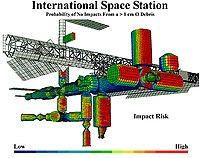
Photo from wikipedia
The potential devastation that a nuclear accident can cause to public health and the surrounding environment demands robust emergency preparedness. This includes gaining a greater knowledge of citizens’ needs in… Click to show full abstract
The potential devastation that a nuclear accident can cause to public health and the surrounding environment demands robust emergency preparedness. This includes gaining a greater knowledge of citizens’ needs in situations involving radiation risk. The present study examines citizens’ attitudes to a remediation scenario and their information and communication needs, using focus group data (n = 39) and survey data (n = 2291) from Sweden. The focus groups uniquely showed that adults of all ages express health concerns regarding young children, and many also do so regarding domestic animals. Said protective sentiments stem from a worry that even low-dose radiation is a transboundary, lingering health risk. It leads to doubts about living in a decontaminated area, and high demands on fast, continuous communication that in key phases of decontamination affords dialogue. Additionally, the survey results show that less favorable attitudes to the remediation scenario—worry over risk, doubt about decontamination effectiveness, and preferences to move away from a remediation area—are associated with the need for in-person meetings and dialogue. Risk managers should thus prepare for the need for both in-person meetings and frequent information provision tasks, but also that in-person, citizen meetings are likely to feature an over-representation of critical voices, forming very challenging communication tasks.
Journal Title: International Journal of Environmental Research and Public Health
Year Published: 2022
Link to full text (if available)
Share on Social Media: Sign Up to like & get
recommendations!